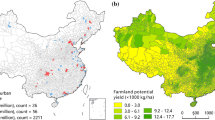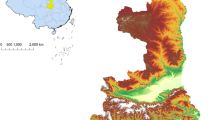Abstract
Land cover is being continuously transformed at an accelerating pace because of urbanization and economic development, which is, in turn, impacting ecosystem services and human well-being. Consequently, there is a need to enhance sustainable land use management to achieve high levels of land eco-efficiency across different regions in China. Accomplishing this entails adjustments not only in terms of the spatial layout of land but also in land use management. The relationship between land use management and land eco-efficiency was explored taking Hebei, a province of China, as a case study. With the help of Stochastic Frontier Analysis (SFA) and other statistical analysis, we analyzed land use conversions and land eco-efficiency in Hebei, China. In this study, we first explored the relationship between land use conversion, ratio of cultivated land, and crop production using scatter plots. Further, we analyzed the land eco-efficiency and ecological performance of cities in Hebei based on SFA. The findings of the study revealed that land use output is the key factor linking land use management and land eco-efficiency. Spatial differences of land eco-efficiency are clearly apparent in Hebei, and the results of the study showed a corresponding decrease in land eco-efficiency with a reduction in the distance to the city center. In conclusion, a step-by-step regulatory process for improving land eco-efficiency within China’s land use management scheme is proposed.





Similar content being viewed by others
References
Bai, Y., Deng, X., Zhang, Q., & Wang, Z. (2017). Measuring environmental performance of industrial sub-sectors in China: A stochastic metafrontier approach. Physics and Chemistry of the Earth,101(2017), 3–12.
Battese, G. E., & Coelli, T. J. (1988). Prediction of firm-level technical efficiencies with a generalized frontier production function and panel data. Journal of Econometrics, 38(3), 387–399.
Battese, G. E., & Coelli, T. J. (1995). A model of technical inefficiency effects in a stochastic production function for panel data. Empirical Economics, 20(2), 325–332.
Boreux, V., Kushalappa, C. G., Vaast, P., & Ghazoul, J. (2013). Interactive effects among ecosystem services and management practices on crop production: Pollination in coffee agroforestry systems. Proceedings of the National Academy of Sciences,110(21), 8387–8392.
Chappell, M. J., & LaValle, L. A. (2011). Food security and biodiversity: Can we have both? An agroecological analysis. Agriculture and Human Values,28(1), 3–26.
Deng, X., Gibson, J., & Wang, P. (2017). Relationship between landscape diversity and crop production: A case study in the Hebei Province of China based on multi-source data integration. Journal of Cleaner Production,142, 985–992.
Deng, X., Huang, J., Rozelle, S., & Uchida, E. (2010). Economic growth and the expansion of urban land in China. Urban Studies,47(4), 813–843.
Deng, X., Li, Z., & Gibson, J. (2016). A review on trade-off analysis of ecosystem services for sustainable land-use management. Journal of Geographical Sciences,26(7), 953–968.
Deng, L., Liu, G., & Shangguan, Z. (2014). Land-use conversion and changing soil carbon stocks in China’s ‘Grain-for-Green’ program: A synthesis. Global Change Biology,20(11), 3544–3556.
Deng, X., Su, H., & Zhan, J. (2008). Integration of multiple data sources to simulate the dynamics of land systems. Sensors,8(2), 620–634.
Díaz, S., Demissew, S., Carabias, J., Joly, C., Lonsdale, M., Ash, N., et al. (2015). The IPBES conceptual framework—Connecting nature and people. Current Opinion in Environmental Sustainability,14, 1–16.
Foley, J. A., DeFries, R., Asner, G. P., Barford, C., Bonan, G., Carpenter, S. R., et al. (2005). Global consequences of land use. Science,309(5734), 570–574.
Godfray, H. C. J., Beddington, J. R., Crute, I. R., Haddad, L., Lawrence, D., Muir, J. F., et al. (2010). Food security: The challenge of feeding 9 billion people. Science,327(5967), 812–818.
Jiang, L., Deng, X., & Seto, K. C. (2013). The impact of urban expansion on agricultural land use intensity in China. Land Use Policy,35, 33–39.
Lambin, E. F., & Meyfroidt, P. (2011). Global land use change, economic globalization, and the looming land scarcity. Proceedings of the National Academy of Sciences,108(9), 3465–3472.
Liu, J., Liu, M., Zhuang, D., Zhang, Z., & Deng, X. (2003). Study on spatial pattern of land-use change in China during 1995–2000. Science in China, Series D: Earth Sciences,46(4), 373–384.
NSBC (National Bureau of Statistics of China). (2011). China statistical yearbook. Beijing: China Statistics Press. (in Chinese).
Palacios, M. R., Huber-Sannwald, E., Barrios, L. G., Paz, F. P. D., & Hernandez, J. C. (2013). Landscape diversity in a rural territory: Emerging land use mosaics coupled to livelihood diversification. Land Use Policy,30(1), 814–824.
Pang, J., Chen, X., Zhang, Z., & Li, H. (2016). Measuring eco-efficiency of agriculture in China. Sustainability,8(4), 398.
Reinhard, S., Lovell, C. A. K., & Thijssen, G. (1999). Econometric application of technical and environmental efficiency: An application to Dutch dairy farms. American Journal of Agricultural Economics, 81(1), 44–60.
Romme, W. H., & Knight, D. H. (1982). Land use conversion: The concept applied to Yellowstone Park. BioScience,32, 664–670.
Schindler, S., von Wehrden, H., Poirazidis, K., Wrbka, T., & Kati, V. (2013). Multiscale performance of landscape metrics as indicators of species richness of plants, insects and vertebrates. Ecological Indicators,31, 41–48.
Shephard, R. W. (1970). Theory of cost and production functions Princeton. Economic Journal,35(3), 177–188.
Song, M., Wang, S., & Liu, W. (2014). A two-stage DEA approach for environmental efficiency measurement. Environmental Monitoring and Assessment,186(5), 3041–3051.
Sonter, L. J., Barrett, D. J., Moran, C. J., & Soares-Filho, B. S. (2015). A land system science meta-analysis suggests we underestimate intensive land uses in land use change dynamics. Journal of Land Use Science,10(2), 191–204.
Sunderland, T. C. (2011). Food security: Why is biodiversity important? International Forestry Review,13(3), 265–274.
Verburg, P. H., Erb, K. H., Mertz, O., & Espindola, G. (2013). Land system science: Between global challenges and local realities. Current Opinion in Environmental Sustainability,5(5), 433–437.
Verburg, P. H., Neumann, K., & Nol, L. (2011). Challenges in using land use and land cover data for global change studies. Global Change Biology,17(2), 974–989.
Xu, Z., Xu, J., Deng, X., Huang, J., Uchida, E., & Scott, R. (2006). Grain for green versus grain: Conflict between food security and conservation set-aside in China. World Development,34(1), 130–148.
Zeng, C., Deng, X., Xu, S., Wang, Y., & Cui, J. (2016). An integrated approach for assessing the urban ecosystem health of megacities in China. Cities, 53, 110–119.
Acknowledgements
This work was financially supported by National Natural Science Fund for Distinguished Young Scholar (Grant No. 71225005), National Natural Science Foundation of China (Grant No. 41771568), and the National Natural Science Foundation of International/Regional Cooperation and Exchange Programs (Grant No. 71561137002).
Author information
Authors and Affiliations
Corresponding authors
Rights and permissions
About this article
Cite this article
Deng, X., Gibson, J. Sustainable land use management for improving land eco-efficiency: a case study of Hebei, China. Ann Oper Res 290, 265–277 (2020). https://doi.org/10.1007/s10479-018-2874-3
Published:
Issue Date:
DOI: https://doi.org/10.1007/s10479-018-2874-3




